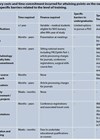Ophthalmology is an extremely popular and competitive career option, with one of the highest competition ratios at ST1 level entry (10:1 in 2023) [1]. It is also a highly rewarding speciality, involving: a mixture of medicine and surgery in a diverse patient group, subspecialisation, academia / research and a great work-life balance.
If you are considering a career in ophthalmology, medical school is a great place to start building that all-important portfolio that you will need when applying for ST1. The portfolio is scored out of 50. Read on to find out how you can grab some ‘easy’ points as a medical student.
Three birds, one stone (combined max. 17 points)
One combination that can be capitalised on is a mix of prizes and awards (max. six points), QIP/audit projects (max. five points) and presentations (six points).
Points are awarded for the best presentation or poster at national and international meetings. As a medical student, be proactive and ask registrars / consultants for any projects that you could get involved in – they often have many!
At the beginning, focus on learning the skills and process required for organising a study. Later down the line, aim to take the lead on project(s) and present your results at conferences and meetings.
There are multiple annual national student conferences that occur throughout the academic year – for example, the National Student Ophthalmology Conference which took place in March 2023. By leading an excellent QIP / audit (i.e., designing, initiating, completing the audit loop and implementing change) and presenting it at a conference / meeting (and hopefully winning a prize), you can theoretically kill three birds with one stone.
The Duke Elder exam
You are strongly encouraged to sit the Duke Elder exam and should apply for this through your medical school. Scoring in the top 60% of candidates gives you one point for the portfolio; the top 10% score 0.5 points and the top 20 receive a special commendation from the Royal College of Ophthalmologists (RCOphth). It is designed to be a tough exam to differentiate between those who have studied and actually want to pursue ophthalmology, and those who have done no preparation beforehand. A few months of revision will set you apart – my recommendations are:
- EyeDocs Question Bank: www.eyedocs.co.uk/duke-elder-exam-info
- Duke Elder course run by Moorfields Eye Hospital
- Lecture Notes in Ophthalmology (2016) authored by Bruce James, Anthony Bron and Manoj V Parulekar
- The Duke Elder Exam of Ophthalmology: A Comprehensive Guide for Success (2019) edited by Mostafa Khalil and Omar Kouli.
Ophthalmology speciality links and commitment (max. 12 points)
Up to two points are awarded for case reports / non-peer reviewed publications in ophthalmology. If you meet any patients with interesting eye pathology, speak to a friendly ophthalmologist and ask if they think it would be suitable to write up as a case report. You can publish these in journals such as Eye News or BMJ Case Reports.
One point is awarded for completing each of the following:
- An undergraduate project
- Ophthalmology elective
- Taster week
- Attendance at 10 ophthalmology clinics / theatre sessions outside of a formal taster week.
My advice is to get involved with the ophthalmology team at your local teaching hospital whilst on placement and ask a consultant if they would be happy to supervise you for an elective. Moorfields Eye Hospital have an elective programme but do plan ahead early as spaces fill very quickly. Apply for an elective bursary award, such as the Patrick Trevor-Roper Travel Award by RCOphth [2].
Taster weeks are typically undertaken during FY2, so if you wish to gain this point during medical school, you will probably have to do this in your own time / holidays. The key to all of this is to always obtain evidence for what you have done – this is usually in the form of a letter detailing the dates and clinics / theatre sessions you have attended, signed by your supervising consultant on hospital letter headed paper.
Points are awarded for attending national and international ophthalmology meetings and courses. The following are a good selection to get started on:
- RCOphth Annual Congress
- Microsurgical Skills Course, RCOphth
- FOCUS (Foundation Course in Ophthalmology), Edinburgh
- Ophthalmology Summer School, UCL Institute of Ophthalmology
- Association for Research in Vision and Ophthalmology Annual Meeting (ARVO).
Publications (max. six points)
Publications are notoriously difficult to achieve. In hindsight, however, I definitely had more ‘free’ time as a medical student where I was not bound by a busy on-call rota. My advice is to be keen and get involved in as much as you can as a student but be prepared that not every project will yield exciting results. Approach every project with the aim of producing some kind of output and try to follow every project to completion if you can.
Education and teaching (max. five points)
Points are awarded for designing an educational course or e-learning tool. Writing a chapter in a textbook or writing a book yield maximum points so well done if you are able to do this! From personal experience, I found designing a teaching course the easiest to achieve as a medical student. You could organise a teaching programme / revision course for students in the year(s) below or run a mock OSCE course for students in clinical years. Clearly a good level of organisation is required for these, so I would suggest working with colleagues to organise this. Again, it is key to obtain feedback for these and always ask for a letter signed by your supervising consultant / tutor as proof of your achievement.
Final thoughts
I hope that some of these points will be useful to you in pursuing your dream of a career in ophthalmology. My advice would be to spend as much time in clinic / theatres / shadowing ophthalmologists and think to yourself, “Is this where I would like to see myself in 10 years’ time?” As a medical student, you have the privilege of having an abundance of time and energy – although it may not always feel that way – so try and hit some of those portfolio points early, your future self will thank you.
References
1. Competition ratios for 2023. Health Education England.
https://medical.hee.nhs.uk/medical-training
-recruitment/medical-specialty-training/
competition-ratios/2023-competition-ratios
2. Scholarships, awards and prizes. The Royal College of Ophthalmologists.
https://www.rcophth.ac.uk/events
-courses/scholarships-awards-prizes
[all links last accessed October 2023]
Declaration of competing interests: None declared.
COMMENTS ARE WELCOME










